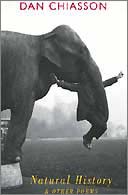***This is a brand new London, England-based Book and Music Review section.***
For more info
LUCID DREAMING
A Review of Natural History &Other Poems
(Bloodaxe, U.K. 2007)
by Dan
Chiasson
and The Deleted World (translated by Robin Robertson)
(Enitharmon, U.K., 2007)
Reviewed by Graham Mummery
"...a lucid dream world where objects are imbued with human qualities..."

Natural History & Other Poems is a selection from Dan Chiasson's two previous American collections with new poems. The striking thing about the book is how unashamedly literary it is. References abound writers from the past: Gorky, Plato, Pliny and Horace, some of whom also appear as characters in the book. Right from the start, it announces high ambition with a quotation on the nature of consciousness and a second warning that we cannot fall out of this world.
We are taken into a lucid-dream world where objects are imbued with human qualities including consciousness. The most successful poems are ones like "Cicada", and later poems in voices of a mosaic and an aquarium, where they keep their physicality. Equally effective are poems on the elusive, chaotic nature of self and the role of the poet, even if what is said here is less original.
This approach at times risks accusation of cleverness. At best, the writing avoids this with its elegance and lyricism. But there are irritating poems where one feels the poet has taken eye off the subject matter and is looking more towards his critics. The most extreme example of this is a poem where Randall Jarrell speaks about Dan Chiasson. This may be tongue-in-cheek and has literary precedents in writers such as Borges, but it still comes across as self-congratulatory.
Fortunately such examples are rare. The elegance and lyricism usually win through. The best poems give much pleasure, and may set readers thinking and experiencing in new ways.
Tomas Transtromer is widely touted as Sweden's most important poet. He has been translated into many languages, and , as has been well-served in English by distinguished translators such as Robin Fulton and Robert Bly. Thus his dream-world may already be familiar to readers
In The
Deleted World, Robin Robertson joins their ranks. Adopting
an imitation approach to translating (like Lowell), Robertson
has worked closely with Swedish academics as well as the poet
himself to produce some delightful versions which a reproduced
beside the originals. Not knowing Swedish (but having read other
translations), it would appear that despite this freer approach
to translating, these are very close workings, recognisably the
same poems.
Economical with words Transtromer produces vivid images: a storm puts its mouth to the house / and blows to get a tone: a car shivers and skews on ice. He paints a world where dream and nature overlap. Landcapes are littered with a machinery such as a rusty tugboat that is strangely far in land. He crosses thresholds of consciousness, his unsentimental yet mystical sensibility fully engaged with his subject matter, without the occasional indulgences that occasionally mar Chiasson's book.
My only complaint is the books shortness (40 pages including both originals and versions). The collected poems from Bloodaxe has178 pages of translations without the originals. This is an appetiser rather than a main course, but well worth the look all the same. Those unfamiliar Transtromers work will have find an excellent intoduction. Those familiar will find new angles on familiar friends
Graham Mummery
25th February. 2007
PREVIOUS REVIEW
REMEMBER READERS?
NEXT REVIEW